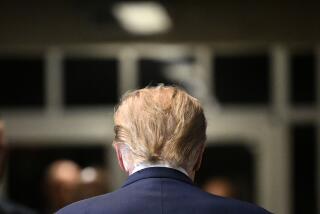Cambodians See Risks in a Khmer Rouge Trial
- Share via
PHNOM PENH, Cambodia — Yes, of course, Saroeun Kim said, the Khmer Rouge leaders should be brought to trial. Among the more than 1 million Cambodians they killed were his mother and father, his brothers, most of his aunts, uncles and cousins.
“I don’t want revenge, but I can never forgive or forget,” said Kim, 29, who tends bar in Phnom Penh, the capital, and studies computer science. “I remember the day two men came to get my mother, and I remember seeing her body in a pile of corpses. Just hearing my own story makes me sad.”
Kim speaks of wanting justice, as do most Cambodians. But at what risk? If the arrest and trial of the late Khmer Rouge leader Pol Pot’s lieutenants occur and lead to renewed fighting or political instability, would he still want the men brought before an international tribunal? Well, maybe not, he said; what matters most now is reconciliation and peace.
Many Cambodians, so traumatized by the Khmer Rouge’s 1975-79 reign of terror that they just want to get on with what is left of their lives, express a similar conflicted ambivalence. They fear that a trial would reopen unbearable psychological wounds and rock the fragile foundation on which Cambodians are trying to rebuild a viable nation.
“No tribunal. No tribunal. No tribunal,” Commerce Minister Cham Trasidh told an Indochina seminar on regional development here recently, his voice rising with emotion. “Justice can wait. Reconciliation must come first. And you can consider me a credible spokesman. The Khmer Rouge killed 84 members of my family.”
The international pressure for a trial has mounted since two senior Khmer Rouge leaders--Khieu Samphan, 67, and Nuon Chea, 71--came out of the jungles in December and defected to Prime Minister Hun Sen’s side. Their defection--or, more accurately, surrender--represented the most important step in the breakup of the Khmer Rouge guerrilla movement.
Hun Sen has in effect dismantled the Khmer Rouge over the past three years by integrating its guerrillas into the Cambodian military and allowing ex-rebel commanders to return to society as ordinary citizens. He has been able to negotiate with the Khmer Rouge in the name of national reconciliation, he says, because he has kept his word that there would be no retribution.
But Hun Sen was unprepared for the international outcry that followed his warm welcome of Khieu Samphan and Nuon Chea in Phnom Penh and their casual remarks that the genocide of the 1970s was in the past and that it was time to “let bygones be bygones.”
Khieu Samphan and Nuon Chea have since returned as free men to the town of Pailin, about 180 miles northwest of this capital.
Hun Sen, after first saying a trial was out of the question, has told diplomats that he would not block efforts to set up an international tribunal. Still, Hun Sen fears that arrests and trials could result in a rebirth of the Khmer Rouge if former guerrillas believed that their security was threatened.
“Certainly the principal Khmer Rouge leaders should be tried for genocide,” said Somchai Homlaor, secretary-general of the Bangkok-based Asia Forum for Human Rights.
“But I think we should give the Cambodia government some time to solve its other problems first. We should not push too hard at this point because peace in Cambodia is very delicate,” Homlaor said.
Pressure on the government to take an official position on a trial will increase later this month when a U.N. team submits its report to Hun Sen on whether there is sufficient evidence to hold a tribunal. The three-member team spent a month in Cambodia last year talking to survivors, inspecting sites of killings and going over documents.
The pressure for a trial has left Hun Sen between a rock and a hard place. If he supports a trial--just as Cambodia is enjoying a semblance of peace for the first time in more than 30 years--he risks shaking the spirit of reconciliation that holds his coalition government together.
And if he rejects the calls for a trial, he risks alienating international donors, who will meet in Tokyo on Thursday to decide Cambodia’s aid levels for 1999. Most aid was cut off after Hun Sen overthrew his co-premier, Prince Norodom Ranariddh, in 1997. The assistance began trickling back after elections in July.
“The evidence against the Khmer Rouge leadership is so clear and so irrefutable that even if you were a lousy lawyer, you could get a conviction,” said Youk Chhang, 38, who runs the Document Center of Cambodia, which focuses on Khmer Rouge atrocities.
“If we don’t do something with the evidence, if there isn’t a trial,” Chhang said, “it would be the shame of the century, and Cambodia will continue to be a hostage of our past.”
More to Read
Sign up for Essential California
The most important California stories and recommendations in your inbox every morning.
You may occasionally receive promotional content from the Los Angeles Times.













